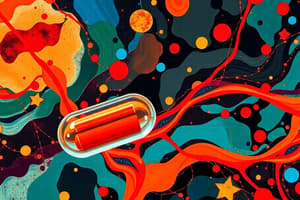Podcast
Questions and Answers
Which type of analgesics are primarily used to treat inflammation?
Which type of analgesics are primarily used to treat inflammation?
- NSAIDS (correct)
- Salicylates
- Opiates
- Acetaminophen
What is a common adverse reaction associated with the use of NSAIDS?
What is a common adverse reaction associated with the use of NSAIDS?
- GI upset (correct)
- Hypoglycemia
- Respiratory depression
- Hearing loss
For which condition are acetaminophen and salicylates not recommended?
For which condition are acetaminophen and salicylates not recommended?
- Inflammatory conditions
- Children with viral illness (correct)
- Severe pain
- Mild to moderate pain
Which analgesic is known to have an unknown action?
Which analgesic is known to have an unknown action?
What condition might contraindicate the use of opiates?
What condition might contraindicate the use of opiates?
What is a potential interaction when using salicylates?
What is a potential interaction when using salicylates?
What is a primary use of opiates?
What is a primary use of opiates?
Which of the following is NOT a common contraindication for NSAIDS?
Which of the following is NOT a common contraindication for NSAIDS?
What is a significant risk when acetaminophen is used in conjunction with barbiturates?
What is a significant risk when acetaminophen is used in conjunction with barbiturates?
Which of the following patients should acetaminophen be avoided in?
Which of the following patients should acetaminophen be avoided in?
What is a common nursing intervention for opiate administration?
What is a common nursing intervention for opiate administration?
Which of the following statements about Reye's syndrome is true?
Which of the following statements about Reye's syndrome is true?
Which condition warrants the use of opiate antagonists?
Which condition warrants the use of opiate antagonists?
What is a possible adverse effect of using opiate antagonists?
What is a possible adverse effect of using opiate antagonists?
Which is a correct statement regarding the use of NSAIDs?
Which is a correct statement regarding the use of NSAIDs?
What should be monitored when administering opiates?
What should be monitored when administering opiates?
Flashcards
Analgesics
Analgesics
A group of medications that reduce pain. You'll see them listed under different categories like NSAIDs, salicylates, or opiates. They can be used for many reasons, like easing pain, reducing fever, or fighting inflammation.
Salicylates
Salicylates
Medications that reduce pain and fever. Some common examples include aspirin and ibuprofen.
NSAIDS
NSAIDS
A type of pain reliever that works by reducing inflammation. Examples include ibuprofen (Advil) and naproxen (Aleve).
Opiates
Opiates
Signup and view all the flashcards
Acetaminophen (Tylenol)
Acetaminophen (Tylenol)
Signup and view all the flashcards
Adverse Reactions
Adverse Reactions
Signup and view all the flashcards
Contraindications
Contraindications
Signup and view all the flashcards
Drug Interactions
Drug Interactions
Signup and view all the flashcards
Opiate Antagonists
Opiate Antagonists
Signup and view all the flashcards
Opioid Tolerance
Opioid Tolerance
Signup and view all the flashcards
Reye's Syndrome
Reye's Syndrome
Signup and view all the flashcards
NSAIDS (Non-Steroidal Anti-Inflammatory Drugs)
NSAIDS (Non-Steroidal Anti-Inflammatory Drugs)
Signup and view all the flashcards
Diuretics and Antihypertensives
Diuretics and Antihypertensives
Signup and view all the flashcards
Opiates (Morphine, Hydrocodone, etc.)
Opiates (Morphine, Hydrocodone, etc.)
Signup and view all the flashcards
Opiate Antagonists (Revex, Narcan)
Opiate Antagonists (Revex, Narcan)
Signup and view all the flashcards
Study Notes
Drug Classifications - Analgesics
- Analgesics are medications used to relieve pain.
- Different types of pain require different types of analgesics.
- Mild, acute pain is treated with aspirin (ASA) or acetaminophen.
- Pain due to inflammation is treated with NSAIDs (nonsteroidal anti-inflammatory drugs).
- Moderate to moderate-potency pain may be treated with opiates like Tylenol with codeine.
- Severe acute pain is treated with opiate partial agonists or opiate agonists.
- Analgesics come in several different classifications.
Schedules of Controlled Substances
- Schedule I drugs have a high potential for abuse and have no currently accepted medical use. Examples include Ecstasy, heroin, LSD, and marijuana.
- Schedule II drugs have a high potential for abuse and may lead to severe psychological or physical dependence. Examples include hydromorphone, methadone, meperidine, oxycodone, fentanyl, morphine, opium, and some stimulants.
- Schedule III drugs have less potential for abuse than Schedules I or II. They may lead to moderate or low physical dependence or high psychological dependence. Examples include hydrocodone/acetaminophen, buprenorphine, and others.
- Schedule IV drugs have a low potential for abuse relative to Schedule III substances, primarily containing limited quantities of certain narcotics. Examples include alprazolam, carisoprodol, clonazepam, and others.
- Schedule V drugs have a very low potential for abuse and consist primarily of preparations containing limited quantities of narcotics. Examples include Robitussin AC and similar preparations.
Types of Analgesics
- Salicylates (e.g., aspirin)
- NSAIDs (e.g., ibuprofen, naproxen)
- Opiates (e.g., morphine, codeine)
- Non-salicylates (e.g., acetaminophen)
How Analgesics Work
- Salicylates and NSAIDs are thought to work by inhibiting prostaglandins.
- The mechanism of action for acetaminophen is not fully known.
- Opiates bind to opiate receptor cells in the central nervous system (CNS).
Uses of Analgesics
- Salicylates are used for mild-to-moderate pain, antipyretic effects (fever reduction), inflammation, and as antiplatelet agents.
- NSAIDs are used for pain relief, inflammation, and other conditions like mild-to-moderate pain, and primary dysmenorrhea (menstrual cramps).
- Opiates are used for severe pain, anxiety reduction, and sometimes for opiate dependency or coughs.
Adverse Reactions
-
Salicylates can cause GI upset, heartburn, nausea, vomiting, anorexia, bleeding, and hearing loss.
-
Non-salicylates can cause urticaria, hemolytic anemia, pancytopenia, hypoglycemia, jaundice, and hepatotoxicity.
-
NSAIDs can cause GI upset, pancytopenia, thrombocytopenia (low platelet count), and aplastic anemia.
-
Opiates can cause sedation, respiratory depression, and urinary retention.
-
Bleeding, ulceration, or perforation can happen with NSAIDs.
-
Constipation can occur with NSAIDs and opiates.
Contraindications
- Salicylates should not be used for children under age 12 with viral illnesses due to Reye's syndrome risk. They're also contraindicated in patients with bleeding disorders or who have a history of viral illness.
- NSAIDs use is contraindicated in the third trimester of pregnancy and in those allergic to sulfa drugs or with a history of cardiovascular disease or stroke.
- Acetaminophen use is contraindicated with habitual alcohol use or concurrent use with salicylates or other NSAIDs.
- Opiates use is contraindicated in patients with acute bronchial asthma, emphysema, upper airway obstruction, head injuries with increased intracranial pressure, or convulsive disorders with severe renal or hepatic dysfunction.
Interactions
- Salicylates can increase the risk of bleeding with anticoagulants and increase the risk of salicylism with carbonic anhydrase inhibitors.
- NSAIDs can increase bleeding risks with anticoagulants and negatively impact diuretics and antihypertensives. Acetaminophen long-term use can increase risk of renal impairment.
- Acetaminophen interacts with barbiturates, increasing their toxicity. It also interacts with isoniazid and rifampin, potentially increasing their toxicity.
- Opiates can interact with alcohol, antihistamines, sedatives, and barbiturates, potentially increasing CNS depression and respiratory depression.
Nursing Interventions
- Give analgesics with food.
- Monitor for bleeding tendencies, GI problems, and any surgical history or hepatic problems.
- Aspirin should be avoided in children under 12 with viral infections to prevent Reye's syndrome.
- Monitor for respiratory depression.
- Monitor for therapeutic effectiveness
- Prevent patient safety.
- Do not use opiates with other central nervous system depressants.
- Taper off opiate use when the medication is discontinued.
Examples of Medications
- Specific examples of different types of analgesics are provided for each class.
Studying That Suits You
Use AI to generate personalized quizzes and flashcards to suit your learning preferences.




